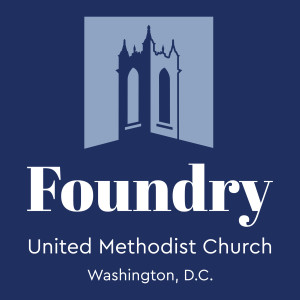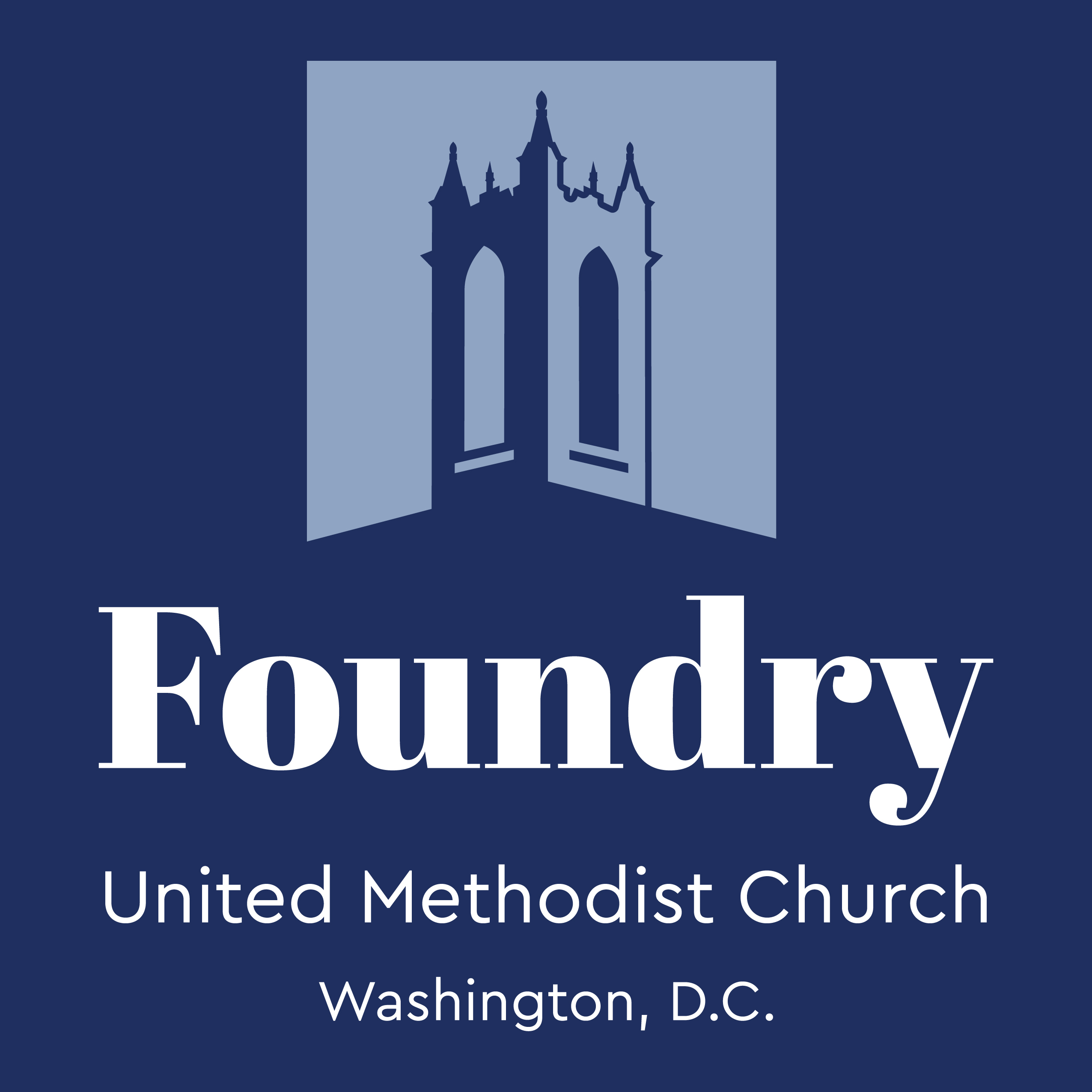Episodes

Sunday Jul 06, 2014
Belonging
Sunday Jul 06, 2014
Sunday Jul 06, 2014
1 Corinthians 3:5-11, Mark 4:26-32
I am not Ed Bauman. I am not Philip Wogaman. I am not Dean Snyder. I am not a man. I am not a Ph.D. I am not an author of many books. I am not over 50 years old. I am not…well, I’m not a lot of things. I must confess that I spent a lot of time and energy earlier this year thinking about everything that I am not. A lot of time and energy. More energy than I probably should admit. Like I actually devised in my mind an implement that would amend me by magically “zapping” me with the most creative and powerful pastoral gifts of the last three senior pastors at Foundry. Seriously. I gave it a name: The Baumoganyder. And then it occurred to me that such a device would be a pretty valuable commodity—other pastors would want to get in on it. With the right marketing, I could parlay this visionary project into a serious money-maker for the Mission Possible capital campaign here at Foundry and that would be a sure way to get on everyone’s good side right off the bat! …way too much time…
But at some point I remembered the words of Paul that we heard today. “What then is Apollos? What is Paul? Servants through whom you came to believe, as the Lord assigned to each.” Paul was speaking to the young church in Corinth, a community that was in conflict, with persons saying they belonged to rival parties: “I belong to Paul,” “I belong to Apollos,” “I belong to Cephas,” and so on. (1 Cor. 1.12) Paul was the “founding pastor.” Apollos was, according to the Acts of the apostles, “an eloquent man, well-versed in the scriptures…he spoke with burning enthusiasm…” (Acts 18.24-25) Cephas, more commonly known as Peter, had high status and strong leadership among the apostles of Jesus. And folks in Corinth were choosing teams. It’s amazing how quickly human community can break down in this way. But I certainly can’t feel superior—as I’ve already admitted my own anxious impulse to compare gifts, to size up myself against the qualities of other pastoral leaders. And, for good or ill, I imagine that many would admit to having favorites among leaders. It is normal to relate to some personalities and styles of leadership more readily or easily than others. And this city is certainly no stranger to folks choosing sides!
“What then is Apollos? What is Paul?” What is Ed Bauman? What is Phil Wogaman? What then is Dean Snyder? “Servants through whom you came to believe, as the Lord assigned to each.” I remember a sermon I heard back in 2003 or 2004. It was a sermon preached to a small gathering of clergy from the Washington district. The preacher was Dean Snyder. Dean shared that at some point he realized that he needed to stop trying to be Phil Wogaman, that he wasn’t supposed to be Phil Wogaman, and that he wouldn’t make a very good Phil Wogaman anyway. He described the sensation of having hands laid upon him at his ordination, remembering the call of God upon his life. Dean said he was called to be Dean—and thank God he was. All the pastors who have labored in this place for 200 years have been called by God to be themselves—their most faithful, gifted, strong, loving courageous selves, to bring what they bring, to be servants through whom the people of God will come to believe in the saving love of God.
These words of scripture—together with a good shaking by the Holy Spirit—snapped me out of my self-obsessed, anxiety-fueled stupor. And I realized that the benefits of “The Baumoganyder”—that is, the fruits of former pastors’ powerful gifts—were already present in Foundry Church. I don’t need to bring them with me. And I remembered the truth of what Paul goes on to say in 1 Corinthians 3: “I planted, Apollos watered, but God gave the growth.” God gave the growth! Oh, that’s right! Everything is not up to me. God gives the growth. Perhaps none of you struggle with an overactive sense of responsibility, or, out of a deeply-felt commitment, try to control things. Maybe none of you ever worry that you aren’t enough, or feel that the weight of the world is on your shoulders. But I have observed both in my own life and in the life of congregations I’ve served, the simple truth that “God gives the growth” pretty easily and quickly can get forgotten. In our independence-loving culture, we can find ourselves feeling and acting like practical atheists—as though we are really on our own and our gifts alone have to get the job done or that by the strength of our own smarts or charm or whatever we will be able to change the world.
The truth is that we are not independent. We depend on God…for life, for growth, for everything. And, out of love—and with an astonishing degree of faith in us—God has given to us the blessing and responsibility of being the church. And all of us—no matter what our call or place within or outside the church—simply offer ourselves as privileged participants in the larger, creative, life-giving work of God. We share in God’s work, bringing all our Spirit-given diversity of gifts and personalities and passions, because without one another some insight or skill will always be lacking for our labor—not to mention life would be pretty dull.
Jesus taught us that the (Kingdom) Kin-dom of God was the heart of our shared labor. And Jesus uses the gardening image in the little parables of the Kin-dom we heard this morning. Seeds get planted and they grow, mysteriously, into a great harvest, into a sheltering home. In youth group I learned a song whose chorus is: “The harvest will come, say the parables of Jesus. We scatter the seeds, let go of our fear. One morning we’ll rise and all cry, rejoicing, ‘Make ready the feast, for the harvest is here!’” Like the farmer in the parable, when we scatter the seeds that we’re given—the seeds of our gifts, our skills, our love, our support, our passion, our money, our trust, and so on—when we scatter the seeds of who we are and let go of our fear then God, who gives the growth, nurtures those scattered seeds and brings about a great harvest.
That is what has been happening here at Foundry for so many years. You, together with all those laity and clergy who have come before, have faithfully, lovingly, courageously scattered the seeds, seeds that God has cultivated and grown into this extraordinary community of faith. And what a harvest is here! Hungry people are fed, the needs of the vulnerable are cared for in myriad ways, truth is spoken to power for the sake of peace in our city and world, and the needs of the poor and homeless are chief among your missional priorities. Thanks be to God! People “of all races, gender identities, sexual orientations ages and physical conditions” are not only welcomed, but embraced and fully included in the life of this congregation—and you have led and we will continue to lead the denomination with an absolute commitment to marriage equality. Thanks be to God! Children and youth are treasured, nurtured, and encouraged to share fully in the life of the congregation through learning, worship, and mission. Thanks be to God! A visionary renovation of our common spaces is planned that will allow for ministry and mission to flow through this place in new and creative ways—and the Mission Possible campaign to support the vision is well-funded (even without my Baumoganyder revenue!). Thanks be to God! Glorious music and deep prayer fills this space on Sundays as you come together with open hearts and hands ready to share and receive love with God and with others. Thanks be to God! God has grown quite a harvest here at Foundry. //
And now I am here as your new Senior Pastor. I am not a lot of things. You and I both know that. And perhaps, for today, the most significant thing I am not, is known to you. Not yet. And you aren’t known to me. But here’s the good news: In the midst of all I am not, God knows what I am; God knows who I am. And God knows what and who you are, as persons and as a congregation. And God has brought us together so that today I can say, with pride, I belong to Foundry. I know that many of you are proud to say that you belong to Foundry. And it is good that we belong to Foundry. It is even better that Foundry belongs to God. We belong to a God whose grace is sufficient, who loves us before we have the capacity to know or speak the name of “God” or the words “church” or “pastor.” We belong to a God who does not expect us to go it alone who, in fact, has promised never to leave nor forsake us. You and I only have to sow the seeds of ourselves, letting go of fear, and then God who gives the growth will provide morning after morning—for many years hence—when together we will arise and proclaim with joy: “Make ready the feast, for the harvest is here!”


No comments yet. Be the first to say something!